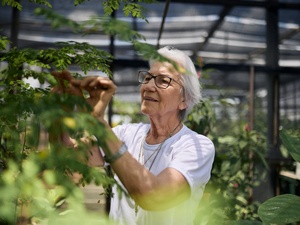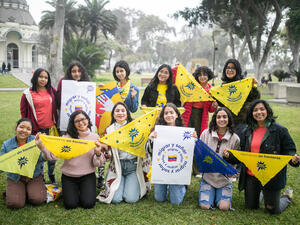Spain grants asylum to battered woman
Spain grants asylum to battered woman
Kyrgyzstan's President Askar Akaev congratulates a Tajik refugee on receiving her Kyrgyz passport and citizenship.
MADRID, Spain, June 9 (UNHCR) - In a precedent-setting decision, the Spanish Inter-ministerial Asylum Commission has given refuge to a 38-year-old woman, who could not find protection from decades of suffering at the hands of her husband whom she had been forced to marry. The woman's identity and country of origin have been kept secret to protect her from possible retaliation and to enable her to start a new life far from her home country.
She had suffered continuous abuse and mistreatment by her husband and his family. The beatings were so severe that she was hospitalized on several occasions, but the authorities did not come to her aid. When she tried to file for divorce, they told her she needed her husband's consent.
In Spain, she asked for asylum and was admitted to the refugee status determination procedure. "From the beginning, it was clear that she needed some form of protection, although it was not at first clear to us what sort of protection," the asylum officer in charge of the case explained.
The national laws in her country are such that, if she were now returned, she would be likely to be taken by her country's authorities, who could well return her immediately to her husband or at least inform him and his family of her whereabouts.
In the past, Spain has granted complementary protection to women fleeing domestic violence, but never refugee status under the 1951 Convention. To be recognized as a refugee, an asylum seeker must have a well-founded fear of being persecuted for reasons of their race, religion, nationality, political opinion or membership of a particular social group.
This is therefore the first time Spain has granted refugee status to a woman who could not find protection from serious domestic abuse in her country of origin.
According to the Ministry of Interior, in reaching the decision, "the Asylum Commission took into account the severity and the persistence of the abuse suffered by the woman, the lack of any protection in her country of origin given its legal and social system, and the impossibility of escaping from the abuse in that country."
The Spanish authorities considered that the laws of that country provide no protection to married women. "For the Ministry of the Interior, these women belong to a particular social group [and are thus] worthy of refugee status in Spain," said Interior Minister José Antonio Alonso at a press conference to announce the decision.
It is widely accepted that gender can influence, or dictate, the type of persecution or harm suffered and the reasons for this treatment. It is also widely accepted that women, or a narrower sub-group of women, can be considered a particular social group. In this case, married women in that country were considered a particular social group.
The continuous abuse and severe beatings inflicted upon the woman by her husband in this case violated a number of her fundamental human rights. These include the right not to be subjected to torture, inhuman or degrading treatment and the right to life, liberty and security of person. The harm she suffered as a result of these human rights violations was found to be a direct result of her gender and her status as a married woman and was thus seen to constitute gender-specific persecution. In the EU context, the Qualification Directive also recognizes that acts of a gender-specific nature can constitute persecution.
Although gender-related persecution, in general, has increasingly been recognized in a growing number of states as falling within the scope of the 1951 Convention's refugee definition, the fact that persecution in the form of domestic violence perpetrated by family members can, in certain situations, fall within the refugee definition is less widely accepted. This decision is therefore a welcome one.
Under Spanish law, UNHCR participates in the Eligibility Commission in an observer capacity and does not vote, but can give its opinion on any asylum application filed in Spain. UNHCR has consistently advocated that gender-related persecution can constitute persecution for one of the five reasons set out in the 1951 Convention and therefore that claimants with a well-founded fear of such treatment should be recognized as refugees.
Spain joins an increasing number of countries where asylum seekers lacking State protection from domestic violence can be recognized as refugees. These include Australia, Canada, Ireland, the United Kingdom, as well as, more recently, Argentina, Romania and now Spain.
By Karin de Gruijl
UNHCR Spain









